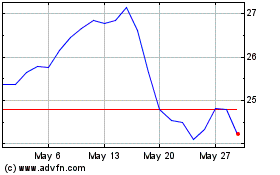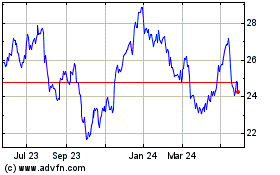Two Europe Firms Halve Libyan Oil Output As Unrest Persists
25 February 2011 - 8:02AM
Dow Jones News
European oil producers Eni SpA (E) and Repsol YFP SA (REP)
Thursday said they've halved their output in Libya due to
continuing unrest, as oil companies operating there have sent crude
prices surging by shutting in production and removing workers.
Estimates differ on just how much of Libya's oil production has
been removed from world oil markets. The International Energy
Agency Thursday said it estimates the Libyan crisis has removed
less than 1% of global production from the market, or between
500,000 and 750,000 barrels per day of crude oil. Yet Paolo
Scaroni, chief executive of Eni--the international energy company
with the biggest operations in the hydrocarbon-rich North African
country--estimated Libya's oil output has dropped as much as
75%.
They agree, however, that oil producers and consumers can deal
with the lost supply if the disruption doesn't spread to other key
oil-exporting nations in the crucial Middle East and North Africa
region.
"There are 1.2 million barrels of oil less [in the markets per
day], which isn't really a lot," said Scaroni at a conference in
Rome. "There's a degree of general uncertainty, and this acts as a
trigger for speculation."
Libya's total daily oil output was about 1.6 million barrels
before a revolt led to widespread chaos and violence, prompting
foreign oil companies to withdraw workers from the country.
The violent clashes and concerns about disrupted Libyan oil
production Thursday lifted international benchmark Brent crude
prices to their highest levels in more than two years. Brent
futures soared to an intraday high of nearly $120 a barrel in
volatile trading. They recently traded around $111.50 a barrel,
after the IEA reassured the market about its ability to deal with a
shortfall.
Uncertainty over precisely how much output is affected by the
upheaval fueled speculation that there might not be adequate spare
production capacity to meet possible further supply disruptions in
the region.
The IEA, however, said it could adequately compensate for a
potential shortfall of oil supplies. It's prepared to release its
emergency oil stockpiles, which can cover up to 145 days of IEA
members' imports. The IEA's industrialized nations have 1.6 billion
barrels of emergency oil stocks available, said the agency.
Spain's Repsol YPF Thursday said it is managing to maintain
production at its Libyan oilfields at around 50% of capacity,
despite the clashes.
Oil companies such as France's Total SA (TOT) and Germany's
Wintershall have shut down operations and begun flying staff to
safety, after violent clashes between forces loyal to Col. Moammar
Gadhafi and protesters led to hundreds of deaths.
Gadhafi's forces maintain control over most of western Libya,
while his opponents hold the eastern side.
"It's difficult to talk to Libya these days," Repsol's Chairman
Antonio Brufau said. "There is confusion, no question about
it."
Eni isn't in contact with the Libyan government, and its only
link with Gadhafi's representatives is with Tripoli's ambassador in
Rome, Scaroni said.
Eni has been present in Libya since 1959, or a decade before
Gadhafi seized power in a military coup. Output from Libya
represents about 14% of Eni's total hydrocarbon production.
The upheaval in Libya has led Eni to shut in more than 50% of
its output from the country, said Scaroni. Eni's current Libyan
production is 120,000 out of the usual 280,000 barrels of oil
equivalent a day, he said.
Tuesday, Eni shut down the Greenstream natural gas pipeline from
Libya that supplies Italy with more than 10% of its needs.
Prolonged political unrest or a more hostile environment to
foreign investment in the Middle East and North Africa could
negatively affect the credit ratings of several European oil
companies, Fitch Ratings said Thursday.
Refiners have brushed aside concerns about potential supply
trouble, as long as the unrest doesn't spread to other producing
countries.
If the output drop remains "limited to Libya, there are plenty
of [supply] alternatives," said Chief Executive Alessandro Garrone
of ERG SpA (ERG.MI), Italy's biggest independent refiner by
capacity, Thursday in Rome.
Top oil exporter Saudi Arabia is in active talks with European
refiners to replace any shortage of Libyan oil supplies, a senior
Saudi oil official said Thursday, in an attempt to reassure markets
that the world's biggest oil exporter can offset lost crude.
Exporting Libyan oil is also becoming a challenge as some ports
are closed due to the clashes and as storage space fills up in
those ports where ships can't funnel the fuel.
In the meantime, Eni's CEO said he hopes to have a "clearer
picture of the overall political situation" when the company
presents its new strategy plan on March 10.
Eni website: http://www.eni.it
-By Liam Moloney, Dow Jones Newswires; +39 06 6976 6924;
liam.moloney@dowjones.com
(Carlo Renda and Daria of MF-DJ, Summer Said in Dubai and David
Roman in Madrid contributed to this article.)
ERG (BIT:ERG)
Historical Stock Chart
From Jan 2025 to Feb 2025

ERG (BIT:ERG)
Historical Stock Chart
From Feb 2024 to Feb 2025
